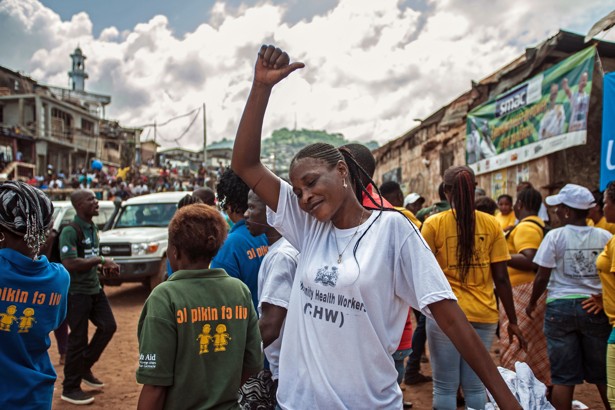Nov. 9 (GIN) – It came in with a bat, wreaked havoc throughout the West African nation of Sierra Leone, but finally, two years since the outbreak, Ebola is on its way to becoming a distant memory.
At a public event this past weekend, Anders Nordstrom, country director of the World Health Organization, confirmed that 42 days had passed without any new cases. This satisfies the criteria that the virus is no longer being transmitted.
“WHO commends the government and people of Sierra Leone for the significant achievement of ending this Ebola outbreak,” he said.
Hundreds of people celebrated Saturday in the streets of the capital, Freetown, where President Ernest Bai Koroma addressed the crowd.
“I am here today as your Head of State to tell you that collectively we have prevailed over this evil virus,” the President declared. “We persevered and we have overcome the challenge that wanted to destroy our very existence in the country.
“We had to change the way we grew up, caring for the sick, respecting our dead and the affection we show when greeting one another.”
To formally memorialize the 4,000 Ebola victims, the president declared Nov. 21 as a nationwide day of thanksgiving with a ceremony at the National Stadium.
Now, barely two months since the last Ebola case, it’s almost business as usual in this West Africa nation. News media are back covering local politics and other pressing issues. Ret. Brig. Julius Maada Bio, once an opposition figure, is now the president’s third lieutenant and leading a campaign against discrimination towards Ebola survivors.
Stopping in Kailahun District where the outbreak started, he urged the community to accept the survivors and not stigmatize them. Some survivors, it was reported, were unable to buy food because market vendors refused to take money they had touched, or motorbike taxis refused to carry them fearing bodily contact.
While Sierra Leone may be Ebola-free, caring for the country’s 4,051 survivors remains a big challenge. Many survivors report joint pain and vision problems, and experts also are worried about the risk of relapse.
To address these needs, Doctors Without Borders, known by its French acronym “MSF”, opened a free clinic for Ebola survivors.
“The persistence of the Ebola virus in the eye is a big challenge,” he said Dr Matthew Vandy, an ophthalmologist. “Cataracts is major cause of blindness [in Sierra Leone] and the only treatment is surgery, so if somebody has a live [Ebola] virus and you operate on that person, you could be touching the virus.”
Vandy is pushing for a study in Sierra Leone on how long the virus can stay in a survivor’s eye. w/pix of women in Freetown







